My dear friends,
Lethargy and languor reign today not as enemies but as restful friends. The jaw-clenching fever a man endures before his own wedding is over — the gauntlet of greetings has ceased, the twice-shaved face which hung so proudly above the collar of my tweed jacket only days ago is now unshorn, porchside with wine-stained lips. Melons and spices, honey-apples and cream, beeswax candles and linen duvets — a thousand pleasant blessings of the good earth are now packed into our little house on the northern plain.
And now, we are home there, together — married.
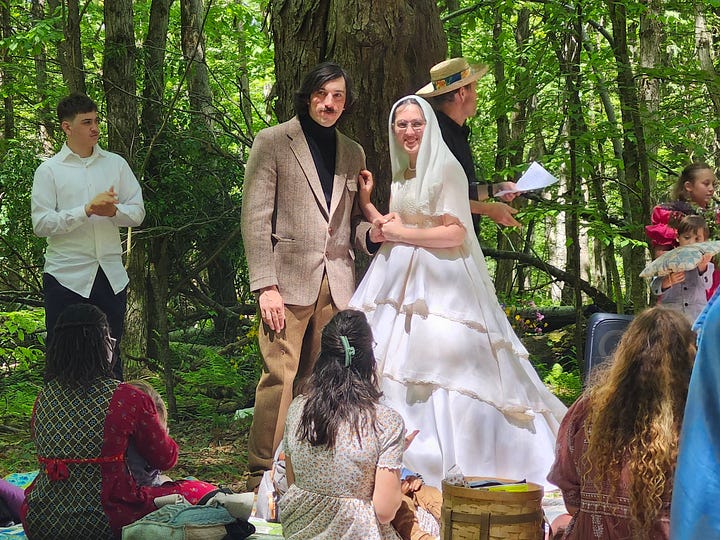
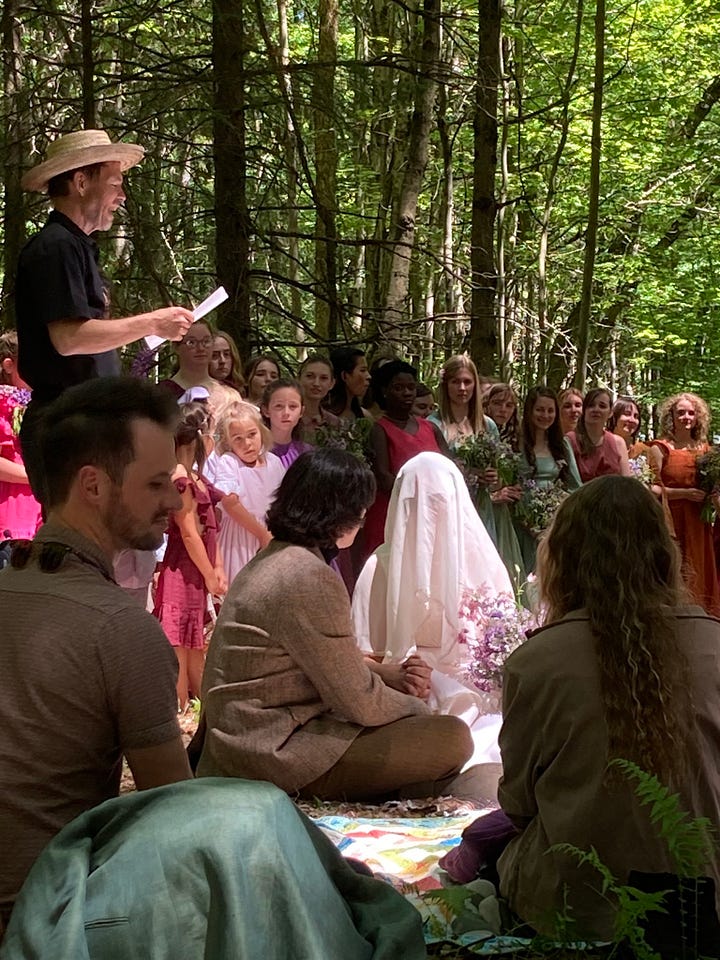
What sort of benediction am I qualified to give over such a scene as this? None exists, none that would suffice — only the orange-brown sunset eyes of a woman who lay sleeping in the chambers of her heart’s satisfaction, the crepes which our neighbor so thoughtfully placed in a basket for our post-nuptial mornings, and the complete and total recognition in my own mind that I have loosed my grip on solitude and its dry, cold, snarling liberties, letting them blow away in the wind.
Yes, to give up the bit — to drop my old schtick, to say ‘no more’ to the desperado and the lonesome rambler in me — to instead arc toward a life of communion and togetherness with a woman who is my undying ally and friend and a beauty among beauties to boot. She — a writer, a traveler, a Christian, with capable hands and an eye for beauty, with a mother’s eyes and a Gypsy’s gait, her eyes cling to my every motion and her ears to my every word, she watches as I spread the map onto the kitchen table and says “yes!”
It is from this strange and wonderful place that I write you all now, writing a letter more than an essay or an article. For the written mode of the essay or article demands a certain verve and energy which I cannot produce today — the raising of velvet curtains and the dimming of lights, the exclamation of the phrase “show business!” and all of the theatrical maximalism of “writing”. No, I have no essays to share today, only a letter — only an attempt at bringing you here to my porch to rest with us, for if you are reading this, you are a friend of ours. You are a part of this life that we have made for ourselves.
For of all the things that our wedding showed me, one stands out: I learned that the connections we make on the internet are not empty or without worth. Keturah and I only met because of the internet. Three in every ten of our guests came from the internet — many of them had traveled great distances to attend, and some of these were even people we had never met. This strange and novel technology — of such recent marque and containing so many gravely negative attributes — facilitated the marriage which will become the basis of our very lives, and brought us into communion with new friends; many of whom are liable to become extremely important lifelong compatriots of the highest quality imaginable.
Perhaps it is easy to be a Luddite. Perhaps in my life as a Luddite I have walked an easy, neat-and-tidy route in at least some regard. For the Luddite is in some sense correct, at least in his assessment of the internet — it would be difficult to seriously counter the idea that the manner in which the Worldwide Web has so drastically and hastily terraformed human relations globally has proven to be a ghastly development. The proliferation of addictions to video gaming and digital gambling and extreme internet pornography; the polarizing, confounding void of conspiracy and memes and political nihilism — the quickness of aunts and cousins and friends to “unfriend” one another over the slightest disagreement or slight: these are the wages of being connected.
And it is easy to be a critic and a revolutionist; to formulate a technically perfect series of arguments which would point toward the unequivocal good of upending, reforming, or completely destroying a state or a cultural norm or a technology — this is the Millenarian motif of the secular twentieth and twenty-first centuries. The dessicated, withering vegan; the miserable Leninist, the paranoiac ‘paleoconservative’, the insufferable zealot of any stripe; what they have in common is making sense within the parameters they themselves have developed. Such types are in the business of formulating ‘correct’ answers to a world they perceive as being a series of ‘problems’ to be ‘solved’.
My life as an anarcho-primitivist, anti-internet Luddite has been hard in the sense that my prerogatives have always been out of step with those around me — but it has been easy insofar as identifying the source of evil and what the ambitions of those who seek a better world should be. A Carrington Event, a solar flare, a catabolic collapse of industrial civilization, a global “logging off”, a smashing of the smartphones and a severing of the undersea fiber optic cables which bring us our perverted news, our sadomasochistic pornography, our idiotic ‘shorts’ and ‘reels’ — an end, an emphatic end; this is as easy to visualize as it is impossible to achieve.
The adoption of any disposition along these lines will result in a completely schlerotic and daft sort of righteous indignation at the blind course of man’s politico-technological history. It will freeze a man in his ‘correctness,’ sucking him downward into a world without style, where he has abrogated his ability to roll with the punches.
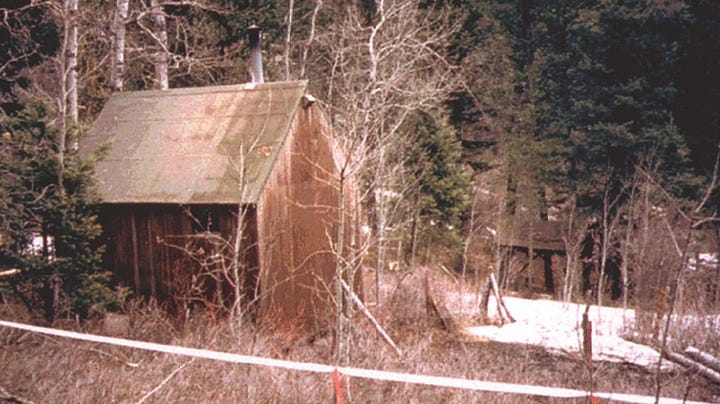
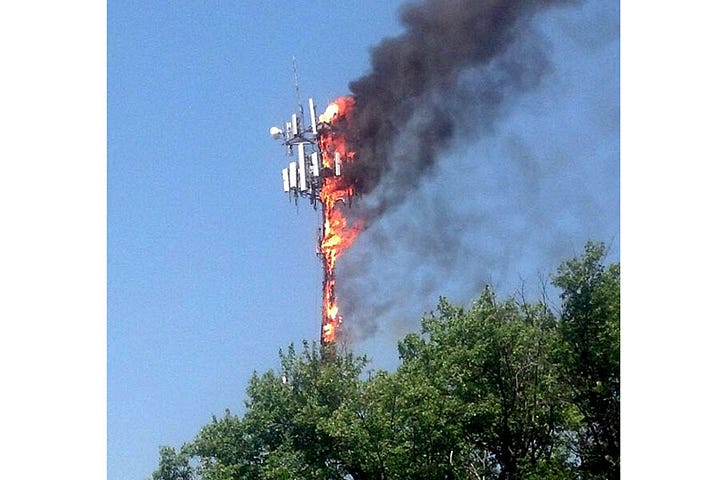
But life is, in actual fact, a graceful and feverish dance with ‘the punches,’ rolling with them so totally that man cannot be stopped — that his vision is only emboldened by emergent phenomena, no matter how ugly it is. Far from crying about the devastating hand of Babylon and the distorted humanity that has flowed from the Neolithic revolution — peasantries the world over have simply leaned in, jumped into the dance, formulated new foods and musical traditions and faiths; they have most often disabused themselves of tears over lost pre-agricultural ways of life and have simply grabbed onto whatever elements of ‘the new thing’ might prove to be deeply human.
Our wedding this weekend strikes me as the only time I have been able to understand what this might look like in our own era.
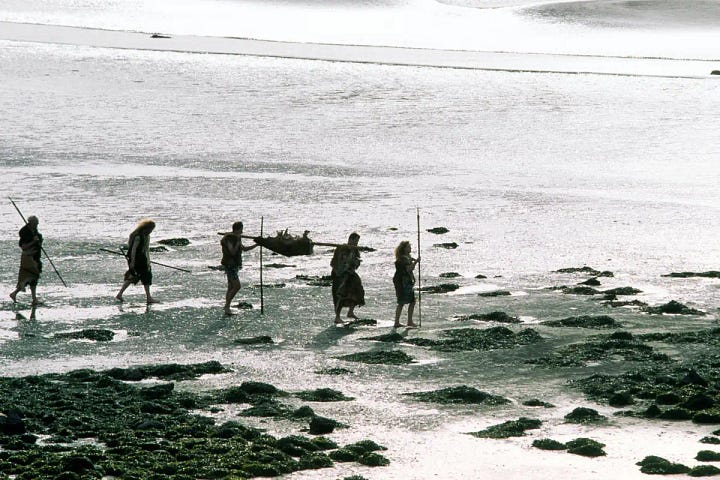

I was only fourteen years old when I first read the words of an especially controversial and distinctly elusive essayist: “The industrial revolution and its consequences have been a disaster for the human race..” I could not — and still cannot — prove the man completely wrong. But far be it from me to reside in a cabin in an isolated stretch of Western wilderness alone, I find my own assessment of technology has deepened with time. Technology is not, as some decidedly milquetoast commentators have perennially offered, ‘neutral’ — it is instead an amplifier of human will. It is only for this reason that its most sophisticated iterations have indeed proven to be a “disaster for the human race.”
Inasmuch as the will of man can be understood to be fallen, it is par for the course to imagine that any ‘will-amplifying’ device or system will naturally and by default have devastating consequences. This thesis seems to have been proven since the emergence of industrial technology; an even-handed analysis even of agriculture and civilization might yield a similar answer. However — quite crucially — if the human will can be refined, edified, and can rise into its most beautiful sort of shape, the will-amplifying nature of technology can quite wonderfully amplify what is good about mankind. Though these instances will be, by nature, exceptions to the rule, they will prove to be spectacular instances of hope and beauty shaped and created by human hands.
Immediately in encountering this sort of argument about technology, any thinking person will make note of various lifesaving technologies and the incredible utility they have to mankind. The open heart surgery, the Coast Guard rescue helicopter, the hip replacement and the root canal; all of these demand high technology, and even the most ardent of Luddites could not refuse them in his hour of need. Doctors, rescuers, firemen, paramedics — these are honorable men who ply a trade of edifying beauty and fantastical benevolence; that their tools are technological in nature does not alter or usurp the brilliance of what they accomplish in any regard at all.
So too with the internet. I reflected on this possibility as I surveyed the crowd at our wedding reception. A sea of faces, many unknown to me, approaching us, calling us by name, saying — “I am so glad to finally meet you both.” They learned of us, and in some cases we learned of them, by way of tiny, rapid flashes of laser light traveling through multi-channel tubes of glass spanning whole continents and indeed, even crossing the world’s largest oceans. A word, a photograph, a hope, a worry — all shared online, all mixed together, boiling over into a series of unlikely offline friendships, an unliklier career as a writer, and, unlikeliest — a marriage.
Both Keturah and I had approached the age at which we had begun to imagine ourselves unmarriagable. Too eccentric, too off-kilter, too strange — poorly suited to being shoehorned into ways of life we both found morbidly objectionable. In ‘the wild’, where men and women still occasionally speak to one another with an eye for courtship, our respective cynicisms might have prevented us from ever interacting. It was only in the strange and liminal zone — the digital equivalent of a thruway Rest Area — that Twitter provided us that we could speak earnestly and candidly, surveying the body of work that we each had offered the public in our tweets and posts. And, finally, it was by way of these public posts that a self-starting matchmaker from Canada decided we’d be well-suited to courtship.
She was, of course, quite right — and we are deeply indebted to her as a result.
That I even began Tweeting at all was rather unlikely. I, being the consummate Luddite, had no “smart” telephone in 2022; I had always resisted the idea. But, the military had shoved me into a strange and purposeless position as a telephone technician, where I was daily tasked with ‘hiding’ in the server room and quite literally ordered to do nothing. Trapped in a Kafkaesque tribe of reclusive military technologists, I began to bring books to work — including some Kafka, as a matter of fact — hoping to read on duty.
I was bitterly reproached by my Chief for this; told that I must never read on duty, and as he told me, I noticed that every other person in the room was scrolling mindlessly on a “smart” telephone. His lecture tickled a rebellious streak, and, in the fashion an enlistedman must channel such impulses, I quietly purchased a “smartphone” and began reading books on it all day.
But, as I read, I found myself “Googling” numerous words, ideas, and historical events. One thing led to another, and I was on Twitter, posting bit by bit, day by day, with increasing frequency. By the time August rolled around that year, I was on Twitter daily — and was accruing a surprising amount of followers and interest. In only a bit over a year’s time, I — a bachelor with only the dimmest ambitions regarding post-enlistment employment — would be well on my way to finding both a job as a writer and, more significantly, a woman with whom I took a profound and undying interest. She is the woman I married on Saturday.
All this brings me, of course, to you.
You, my friend — whomever you may be, as you scroll through the various articles that I post and keep your thumb on the pulse of my life, travels, and pontifications — you are seated at the cliff’s edge between the digital technosphere and “real life”. You know me in a fashion that many who’ve known me for decades do not know me; you are only one message and a bit of logistics away from sharing a journey or a beer, from potentially striking up a lifelong friendship with me or with anyone in my orbit. Your “likes” on my articles tell me to keep going. Your monthly contributions not only literally feed me but embolden Keturah and I to raise a family, to take bigger journeys, to plan to delve deeper into the hinterlands on your behalf. Everything about this is “real life” — and this entire space is, as I see it, pregnant with meaning, a stretch of fresh tilth over which fascinating seeds have been broadcast and sprouting. It is, strangely enough, life-affirming to me — and I hope you feel the same.
Mr. and Mrs. Hickman Hit the Road
It should be said that the events that took place both this month and this weekend were my central temporal concerns for the past six months. All plans I might’ve made were subordinate to June the First — the date of our wedding. Now, for the first time in the last five years of my life, my own schedule is bereft of all obligations — I am riding on sufficient savings and income, with ample interest from my readers, and a desire to chronicle and understand the world’s backwaters and what lay within them. This season is the beginning, not only of my and Keturah’s life as a married couple — but of a new era of travel and writing for us both. It is the springtime of our lives, and we are thrilled to share it with you.
Now, we enter the honeymoon season — transitioning from our home in northern New York State into the Dominion of Canada; traveling for a couple months from Quebec to the Canadian Maritimes and beyond.
After our honeymoon, it will be time for a new, major travel and writing project. Our ambition is to select twelve American towns under 5,000 in population and to situate ourselves in each for a period ranging from two to six weeks. In each, I’ll aim to find some kind of informal work if any is available, accepting the first job I am offered, and we’ll stay in whatever accomodation exists, be it a campground, a motel, an efficiency, or in a reader’s yard or garage, posting long articles on Substack about life as we find it there. It will be my aim to make consistent posts for my paying readers every 5-7 days.
This notion came to my mind chiefly because while I have traveled extensively through the United States, my travels have often been quick, brief, and involving a near-constant state of motion. For years, I seldom stayed anywhere for much longer than 48 hours — and I realize in retrospect that my view of America is likely incomplete as a result. After all, the human dimension of the small, isolated towns that I have often sought out takes a great deal of time to understand — and by living and working in them for a longer period of time, we’ll be able to give them a ‘deeper’ read.
With any luck, we can chronicle the last tendrils of the nation that is in our own hearts. Perhaps we’ll succeed in assuaging the gnawing fear that rural America will be paved over, reconfigured, canceled, or forgotten. If we’re truly blessed, we might just fall back in love with our country — standing fast by her to protect what remains of her old bones and tattered stories, writing her love notes, rekindling the world of Tom Sawyer and Johnny Appleseed. If I have any duty in my life, it is probably this — and by carefully choosing twelve towns that exemplify the spirit of their respective regions, I’ll be well-positioned to carry out that duty to the best of my ability.
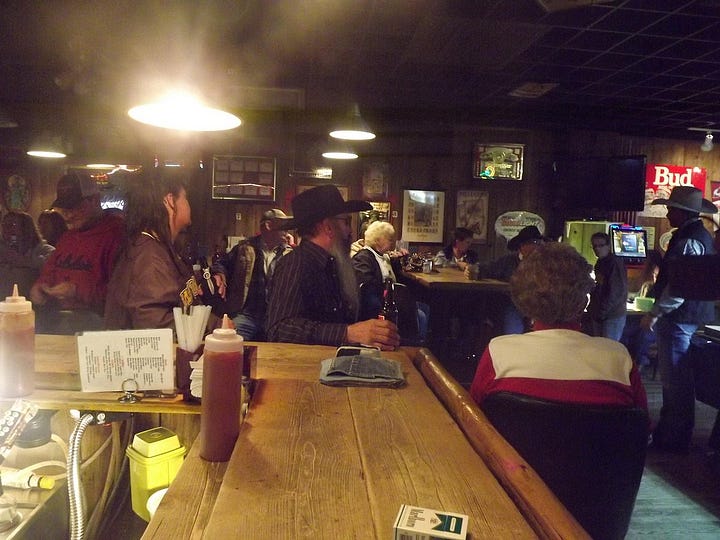



Finally, next week I’ll be posting an in-depth travelogue and review of Amtrak’s USA Rail Pass, which I used last month for the first time. I had aimed to have this posted already — but our wedding took precedence, and I found that the Amtrak was so intensely social I had far less time to write than I had anticipated! So in all, I’ve got a bit of catching up to do once we get to Quebec.
May God bless each of you. Big thanks to those who traveled up to Northern New York to attend our wedding — your presence, encouragement, gifts, and blessings meant the world to us. As we set off on the road again, I’m looking forward to meeting more of you wherever we can cross paths.






I hope that you find your rest, and in each other, a place you cannot leave.
Congratulations on your marriage. I like the telling of this story. You have a beautiful writing style.